Delphi Home | History | Tools & Resources | Books & Articles | News & Events | Delphi Award | FAQ
General FAQs
What do people mean when they use terms like “non-tenure-track,” “adjunct,” or “contingent” faculty? Are there differences?
Yes, there are differences in these terms. Not everyone agrees on how these terms are applied, but we offer an explanation of common terms below.
The terms non-tenure-track faculty and contingent commonly denote both full- and part-time academic staff who are not on the tenure track; they are ineligible to be considered for tenure. It is important to note that this is not a homogeneous group. Individuals may have very different reasons for taking non-tenure-track jobs and the nature of work and working conditions can vary substantially, even on campus.
Full-time non-tenure-track faculty may be referred to as lecturers, instructors, or clinical faculty. Titles and formal classifications may vary by campus and might even differ among the numerous academic units at an institution. They typically work at one institution since they hold full-time appointments.
Part-time faculty are also commonly referred to as adjunct faculty or simply as adjuncts. Depending upon their individual circumstances, some part-time faculty might work only work at one institution. However, they are more likely to have positions at multiple institutions and may aspire to full-time or tenure-track positions.
Although these individuals are not considered for tenure and may not be required or permitted to participate in the full range of teaching, research, and service tasks as tenure-track faculty, they are still faculty. The work they do is tremendously important in the teaching and research missions of the institution. On some campuses, non-tenure-track faculty may teach a large share of the students enrolled in courses, particularly first-years and sophomores or online students. They are often very committed to their field of study and to ensuring the success of the students they teach.
How many faculty are currently employed off the tenure-track?
According to fall 2011 data from the National Center for Education Statistics’ Integrated Postsecondary Education Data System, part-time faculty now represent 51.2 percent of instructional faculty among nonprofit institutions; tenured and tenure-track positions are 29.9 percent and full-time non-tenure-track are 19.1 percent. Part-time faculty increased 3.5 percent and full-time non-tenure-track faculty by 0.3 percent increase since the previous IPEDS data collection in 2009.
In contrast, in 1969, tenured and tenure-track positions made up approximately 78.3 percent of the faculty and non-tenure-track positions comprised about 21.7 percent, as researchers have pointed out. The shift toward a mostly contingent academic workforce in higher education is not a recent phenomenon, but part of a long-term trend. Over time as these changes have occurred, though, institutions have often not considered the implications for the sustainability of the academic workforce or student learning.
For more detailed statistics and analysis, download our report, National Trends for Faculty Composition Over Time.
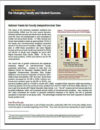
National Trends for Faculty Composition Over Time
The Delphi Project on the Changing Faculty and Student Success
This report is a review of changes in the number and proportions of non-tenure-track faculty as a segment of the professoriate over the past 40 years, including differences by sector and discipline.
Categories: Delphi Project
adjunct faculty community college contingent faculty non-tenure-track faculty statistics
Download 1.39 MB
29732 Downloads
To determine the composition of faculty at your institution, visit the Modern Language Association’s Academic Workforce Data Center, a searchable tool that displays faculty composition data for all nonprofit institutions in the United States.
How much are non-tenure-track faculty typically paid?
Though part-time and full-time non-tenure-track faculty are both paid less than tenured and tenure-track faculty, part-time faculty are customarily paid significantly less than even full-time non-tenure-track faculty for the same work.
Full-time non-tenure-track faculty typically make 26 percent less than tenured faculty, but part-time faculty earn approximately 60 percent less than comparable full-time, tenure-track faculty when their salaries are expressed on an hourly basis (Curtis, 2005; Toutkoushian & Bellas, 2003).
The low end of per-course compensation for full- and part-time non-tenure-track faculty is comparable ($3,171 for part-time and $3,523 for full-time); the disparity is on the high end (Hollenshead et al., 2007).
A more recent study conducted by the Coalition on the Academic Workforce (CAW, 2012) found the median per-course compensation for part-time faculty, $2,700, to be far lower than what tenure-track faculty are paid when standardized to reflect compensation for instruction in a three-credit course. This figure was confirmed by another recent salary survey conducted by the American Association of University Professors.
Although the CAW study did find there is a wage premium for part-time faculty who hold doctoral or other terminal degrees, their rate of pay still falls far below that of full-time non-tenure-track and tenure-track faculty. Length of service to an institution, another factor that typically contributes to increases in compensation, was similarly found to not result in higher levels of compensation for part-time faculty or pay rates comparable to other faculty members.
The workloads of non-tenure-track faculty are usually defined by their teaching, but consideration is not always given to the time faculty must spend preparing for classes, holding office hours, giving feedback on assignments, and communicating with students (Kezar & Sam, 2010).
How did this change come about, and how might things continue to develop?
Drivers of changes in the traditional faculty model have gained momentum in the last few decades, such that now, about 70 percent of faculty in U.S. institutions are employed through part-time or full-time non-tenure track positions, while about 30 percent are tenured or in tenure-track positions.
The primary forces driving change in the traditional faculty workforce model are massification of higher education, enrollment fluctuations, dwindling resources, corporatization, technological advances, and competition from the for-profit sector.
While new faculty workforce models have emerged in response to these forces, no model has been intentionally designed and deployed with long-term institutional goals in mind, with perhaps the exception of the medical school model.
For more detailed answers to these questions, download our white papers on these topics.
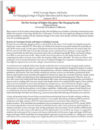
The New Ecology of Higher Education: The Changing Faculty
Adrianna Kezar (2013)
adjunct faculty assessment contingent faculty non-tenure-track faculty student success
Download 0.00 KB
19492 Downloads
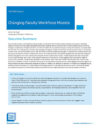
Changing Faculty Workforce Models
Adrianna Kezar
In this TIAA-CREF Insitute paper, Kezar describes the trends that have led to the dramatic change in faculty workforce models and outlines several new models that have emerged.
Categories: Delphi Project
adjunct faculty community college contingent faculty new faculty models non-tenure-track faculty salary and benefits statistics
Download 254.33 KB
20362 Downloads
What are the differences in faculty composition among various types of institutions and disciplinary areas?
There is quite a bit of variation in faculty composition among different types of institutions and disciplinary areas. Historically, community colleges have employed the largest percentages of non-tenure-track faculty, particularly part-time faculty. Fall 2011 data from the National Center for Education Statistics’ Integrated Postsecondary Education Data System suggests that part-time faculty members make up 80 percent or more of the faculty at 11 percent of community colleges nationwide.
There are data concerning the percentages of non-tenure-track faculty in specific disciplinary areas. Overall, faculty in education, fine arts, and business are most likely to work part-time, with more than half the faculty assigned to part-time positions.
- Education: 55.5%
- Social Sciences: 37.4%
- Humanities: 46.2%
- Agriculture and Home Economics: 30.2%
- Engineering: 19.6%
However, these data are over 10 years old and the percentages of part-time faculty in each of these fields has likely increased in following trends across higher education.
For more details, download our report, National Trends for Faculty Composition Over Time.

National Trends for Faculty Composition Over Time
The Delphi Project on the Changing Faculty and Student Success
This report is a review of changes in the number and proportions of non-tenure-track faculty as a segment of the professoriate over the past 40 years, including differences by sector and discipline.
Categories: Delphi Project
adjunct faculty community college contingent faculty non-tenure-track faculty statistics
Download 1.39 MB
29732 Downloads
These national trends do not reflect the reality at every institution, though, right?
That’s right. The national figures represent aggregate data for instructional faculty among all nonprofit, degree-granting institutions in the United States.
A single institution or department may look different than these data with regard to faculty composition. Still, the national data do show us that reliance on non-tenure-track faculty is increasing in every area of higher education. Few, if any, institutions or disciplinary areas are immune to this trend.
Too often, campus leaders say their faculty does not reflect the trends, but are not really aware of the actual numbers or conditions faced by non-tenure-track faculty on their campus. It is very important that leaders on every campus collect data to better understand how many faculty members are employed among the various categories of faculty, and the obstacles and challenges part-time faculty, in particular, face in the workplace. We have created discussion guides to help answer these and related questions that can be used to facilitate an examination of non-tenure-track faculty issues at the campus and department levels, and among leaders of centers for teaching and learning and institutional research offices.
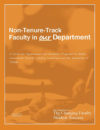
Non-Tenure-Track Faculty in our Department: A Guide for Departments and Academic Programs to Better Understand Faculty Working Conditions and the Necessity of Change
The Delphi Project on the Changing Faculty and Student Success (2012)
This guide is designed for use by faculty and staff at the department level who would like to examine non-tenure-track faculty practices and issues. Its question sections, discussion questions, and concluding questions guide practitioners through the process of examining non-tenure-track faculty issues in the department and help them to better understand challenges associated with current practices and begin to build the rationale for change.
Categories: Delphi Project, Guides
adjunct faculty assessment contingent faculty non-tenure-track faculty salary and benefits worksheets
Download 784.45 KB
63813 Downloads
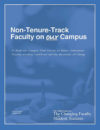
Non-Tenure-Track Faculty on our Campus: A Guide for Campus Task Forces to Better Understand Faculty Working Conditions and the Necessity of Change
The Delphi Project on the Changing Faculty and Student Success (2012)
This guide is designed for use by task forces, committees, or groups who would like to examine non-tenure-track faculty practices and issues at the campus level. Its question sections, discussion questions, and concluding questions guide practitioners through the process of examining non-tenure-track faculty issues on campus and help them to better understand challenges associated with current practices and begin to build the rationale for change.
Categories: Delphi Project, Guides
adjunct faculty assessment contingent faculty non-tenure-track faculty salary and benefits worksheets
Download 981.28 KB
68706 Downloads
What about graduate students? Are they included in your figures?
No, the Delphi Project does not include data for graduate students in its figures on the composition of instructional faculty because the data are less clear about the role of these individuals in providing instruction. For example, graduate students could be teaching courses on their own, serving as teaching assistants, or leading lab sections that are part of larger courses taught by a faculty member.
By excluding graduate students from our figures about rising contingency, we do not mean to imply that this is not an important area of concern. We do need to better understand the role of graduate students who are providing instruction, as well as the ways they are being socialized and prepared to assume roles as future faculty members.
How changing faculty trends affect student success
What is responsible for these negative effects on student outcomes?
The negative effects on student outcomes are correlated with the challenges non-tenure-track faculty members, particularly part-time faculty, often encounter in their daily work. Institutional and departmental policies and practices frequently constrain the efforts of these instructors:
- Last minute hiring and renewals limit the time faculty members have to prepare for teaching.
- The exclusion of non-tenure-track faculty from participation in professional development, including opportunities to receive funding for conferences and workshops held off campus, prevents them from learning about and adopting high-impact practices, new pedagogies, and other innovative strategies to improve the quality of instruction and student learning outcomes.
- When non-tenure-track faculty are not permitted and encouraged to participate in curriculum design, their courses may be misaligned with institutional and program goals, problems with the curriculum may persist without being addressed, and faculty expertise is not fully utilized.
These are just a few examples. For more details, download our resources that show the correlations between changing faculty trends and student success.
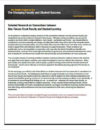
Selected Research on Connections between Non-Tenure-Track Faculty and Student Learning (2013)
adjunct faculty community college contingent faculty non-tenure-track faculty statistics student success
Download 1.41 MB
31245 Downloads
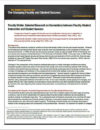
Faculty Matter: Selected Research on Connections between Faculty-Student Interaction and Student Success
The Delphi Project on the Changing Faculty and Student Success (2013)
This bibliography includes summaries of a sample of selected studies that describe the importance of faculty-student interactions for facilitating positive student outcomes.
Categories: Delphi Project, Student Success
adjunct faculty contingent faculty non-tenure-track faculty student success
Download 1.42 MB
30330 Downloads
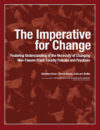
The Imperative for Change: Fostering Understanding of the Necessity of Changing Non-Tenure-Track Faculty Policies and Practices
Adrianna Kezar, Daniel Maxey, Lara Badke (2014)
This summary outlines the necessity for addressing the changing faculty and its implications for student learning outcomes, equity, and institutional risk management. It aims to build an understanding of the implications of the current faculty model and policies and practices affecting non-tenure-track faculty, as well as to facilitate a conversation about change that begins with a shared appreciation of the potential risks of inaction or inattention to these problems.
Categories: Delphi Project, Student Success
adjunct faculty community college contingent faculty non-tenure-track faculty salary and benefits statistics student success
Download 451.35 KB
58886 Downloads
Do we really know that the rise of part-time faculty is having an adverse effect on student outcomes?
The two phenomena are correlated. A number of studies (Benjamin, 2003; Bettinger & Long, 2010; Eagan & Jaeger, 2008; Ehrenberg & Zhang, 2004; Gross & Goldhaber, 2009; Harrington & Schibik, 2001; Jaeger & Eagan, 2009; Jacoby, 2006) show that growing reliance on non-tenure-track faculty and part-time faculty, in particular, is related to student learning and outcomes. These correlations include:
- diminished graduation and retention rates
- decreased transfer from two- to four-year institutions
- pronounced negative effects of early exposure to part-time faculty
- reduced faculty-student interaction
Many policies impede the ability of faculty to provide effective instruction that is aligned with departmental and institutional goals for learning outcomes. On many campuses, current policies create conditions wherein these faculty members are inaccessible to students outside of scheduled class time and are not permitted to have a role in decision-making, including decisions about the courses they teach.
For a discussion of how such conditions influence the ability of institutions to maximize the benefits of non-tenure-track faculty contributions to student learning, download our resources on student success.
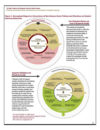
Review of Selected Policies and Practices and Connections to Student Learning
The Delphi Project on the Changing Faculty and Student Success (2013)
The summary discusses how certain conditions created by policies – or a lack of policies – influence the ability of institutions to maximize the benefits of non-tenure-track faculty contributions to student learning.
Categories: Delphi Project, Student Success
adjunct faculty contingent faculty non-tenure-track faculty student success
Download 2.12 MB
23055 Downloads

Faculty Matter: Selected Research on Connections between Faculty-Student Interaction and Student Success
The Delphi Project on the Changing Faculty and Student Success (2013)
This bibliography includes summaries of a sample of selected studies that describe the importance of faculty-student interactions for facilitating positive student outcomes.
Categories: Delphi Project, Student Success
adjunct faculty contingent faculty non-tenure-track faculty student success
Download 1.42 MB
30330 Downloads

Selected Research on Connections between Non-Tenure-Track Faculty and Student Learning (2013)
adjunct faculty community college contingent faculty non-tenure-track faculty statistics student success
Download 1.41 MB
31245 Downloads

The Imperative for Change: Fostering Understanding of the Necessity of Changing Non-Tenure-Track Faculty Policies and Practices
Adrianna Kezar, Daniel Maxey, Lara Badke (2014)
This summary outlines the necessity for addressing the changing faculty and its implications for student learning outcomes, equity, and institutional risk management. It aims to build an understanding of the implications of the current faculty model and policies and practices affecting non-tenure-track faculty, as well as to facilitate a conversation about change that begins with a shared appreciation of the potential risks of inaction or inattention to these problems.
Categories: Delphi Project, Student Success
adjunct faculty community college contingent faculty non-tenure-track faculty salary and benefits statistics student success
Download 451.35 KB
58886 Downloads
Are part-time faculty less committed than their counterparts?
No. Part-time faculty members are highly committed and talented educators (Leslie and Gappa 2008); they are knowledgeable about their fields of study and care just as deeply about the success of their students as other educators do. Many go above and beyond what is expected of them and work in excess of the time for which they are paid in order to provide a high quality educational experience for students (Street, Maisto, Merves, and Rhoades 2012). They are often interested in learning new skills and strategies for improving the effectiveness of their teaching, but may have very few, if any, opportunities to do so.
For a more in-depth answer to this question, download the Center for Future of Higher Education’s report, Who Is Professor “Staff”?
Are adjunct instructors less prepared or less adequate teachers?
We are disturbed when education research gets misinterpreted to imply that adjunct, part-time, and other non-tenure-track teaching professionals are somehow inadequate instructors.
While studies do show an association between poor student outcomes and adjunct-led courses, the problem lies not with the quality of the instructors themselves, but rather with the conditions under which they are compelled to work. Kezar’s research (2013) clearly shows how poor working conditions for adjunct faculty are the likely cause of poor student outcomes.
There is no research evidence that finds adjunct instructors as a group make for lower-quality teachers. Just as tenure-track faculty members have varying levels of teaching experience and efficacy, individual adjunct instructors too vary in their experience and effectiveness in the classroom. However, there is much research that suggests adjunct instructors’ best teaching efforts often get hampered by difficult working conditions.
What about studies that have indicated that there was little or no difference between outcomes associated with tenure-track and non-tenure-track faculty?
Many who are skeptical about research suggesting adverse effects associated with growing reliance on part-time faculty point to a recent study by Figlio, Schapiro, and Soter (2013) of courses taught by part-time faculty at Northwestern University. The study suggests that non-tenure-track faculty can foster the same and sometimes even better learning outcomes for students as tenure-track faculty. This research has been interpreted by some as challenging other studies, which suggest that increasing numbers of non-tenure-track faculty who often experience poor working conditions are having an adverse effect on the quality of teaching and learning.
The findings of the study conducted at Northwestern University, though, are limited to students and faculty at a single institution, where even the authors note that the institutional context is different and perhaps more privileged than at many other institutions. That study also includes full-time non-tenure-track faculty, whose working conditions are often similar to tenured and tenure-track faculty. As hypothesized by many researchers, it is not tenure-track status alone that affects quality of teaching and learning, but the policies and practices in place to support faculty.
How to promote change
There’s not really money available to make meaningful changes in how part-time faculty are supported and compensated, though, right?
One of the greatest challenges that academic leaders voice when they address calls to provide additional support for faculty members, particularly those individuals in non-tenure-track positions, is their inability to cover the added expense of providing new programs and services or expanding existing ones. However, many of the ways that colleges could provide additional support for these faculty members are potentially no-cost or low-cost measures that would benefit faculty as well as the students they teach. So, although leaders in higher education do face budgetary constraints and uncertainty over future funding sources, it is a myth that resources are the sole reason that prevents us from ensuring that all our faculty members are adequately supported so they can provide the highest quality of instruction to their students.
A number of institutions have pursued changes to better support non-tenure-track faculty. In all of the cases we have studied, investments designed to support non-tenure-track faculty have resulted in continued investment and sometimes even increased funding for such initiatives because campus leaders realized the benefits for faculty and students.
For details on why leaders should, and how campuses can, make changes to support all faculty, download Dispelling the Myths: Locating the Resources Needed to Support Non-Tenure-Track Faculty.
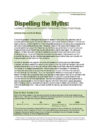
Dispelling the Myths: Locating the Resources Needed to Support Non-Tenure-Track Faculty
Adrianna Kezar, Daniel Maxey (2013)
This resource outlines potential changes that could be made to improve support for non-tenure-track faculty on campuses, organized in terms of those that would be less expensive to implement or would likely require the reallocation of funding or increased expenditures. It also provides a set of strategies for developing services and resources to support the whole faculty, not just full-time or tenured and tenure-track faculty members.
Categories: Delphi Project, Student Success
adjunct faculty contingent faculty non-tenure-track faculty student success
Download 415.76 KB
25986 Downloads
Case studies of institutions that have pursued changes to better support non-tenure-track faculty are also available for download.
But what can I really do to promote change? This seems like a lot to take on!
To begin to address this issue on your campus or within your department, we recommend starting with the five simple steps outlined on our homepage. The Delphi Project offers resources to help you at each stage in the process, from collecting data to facilitating dialogue among different groups in your campus community to building the rationale for change to identifying areas where you can start making strategic changes to better support your faculty.
About the Delphi Project
What are the main objectives of the Delphi Project?
The Delphi Project was initiated in 2012 to support a better understanding of factors that led to a majority of faculty being hired off the tenure track and the impact of these circumstances on teaching and learning, as well as to identify potential strategies for addressing issues of rising contingency together.
Since then, the Delphi Project has been guided by two meta-strategies developed by the original working group: creating a vision for new, future faculty models for improving student success, and building a broad base of stakeholder support for improving conditions facing non-tenure-track faculty.
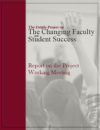
Report on the Project Working Meeting
The Delphi Project on the Changing Faculty and Student Success (2013)
On May 18, 2012, more than 30 participants convened outside Washington, D.C. to discuss the issues faced by non tenure track faculty and to formulate strategies to respond to these challenges in new ways. The two meta-strategies that emerged from the meeting and are captured in this report are the result of a year of planning and collaboration among the project staff, our partners at AAC&U, and participants representing key stakeholder groups from across higher education. Following the meta-strategies is a summary of the meeting, which captures the various perspectives, concerns, and ideas exchanged among project participants in a convening of the full group, as well as more targeted small group discussions.
Categories: Delphi Project, Student Success
adjunct faculty community college contingent faculty new faculty models non-tenure-track faculty salary and benefits statistics student success
Download 2.30 MB
47083 Downloads
Where did the name “Delphi Project” come from?
When the Delphi Project was initiated in 2012, more than 30 key experts — representing a broad cross section of institutional sectors, unions, professional and disciplinary organizations, as well as other perspectives and interests from higher education — participated in the project’s original research using a modified Delphi method approach, in which a group of experts is consulted and then brought together to develop solutions to complex national problems.
These participants completed surveys addressing key issues related to the changing composition of the professoriate, reliance on non-tenure-track faculty, and potential solutions –- all within the context of challenges facing higher education including declining state budgets, rapid changes within fields of study, changing student interests and demographics, and other issues that are attributed to the rise of non-tenure-track faculty. In May 2012, the participants convened to discuss alternative approaches, to question underlying assumptions, and to contribute to the creation of solutions to change the nature of the professoriate. The findings were disseminated as a policy report.

Report on the Project Working Meeting
The Delphi Project on the Changing Faculty and Student Success (2013)
On May 18, 2012, more than 30 participants convened outside Washington, D.C. to discuss the issues faced by non tenure track faculty and to formulate strategies to respond to these challenges in new ways. The two meta-strategies that emerged from the meeting and are captured in this report are the result of a year of planning and collaboration among the project staff, our partners at AAC&U, and participants representing key stakeholder groups from across higher education. Following the meta-strategies is a summary of the meeting, which captures the various perspectives, concerns, and ideas exchanged among project participants in a convening of the full group, as well as more targeted small group discussions.
Categories: Delphi Project, Student Success
adjunct faculty community college contingent faculty new faculty models non-tenure-track faculty salary and benefits statistics student success
Download 2.30 MB
47083 Downloads
Who is behind the Delphi Project?
An initiative of the Pullias Center for Higher Education at the University of Southern California, the Delphi Project on the Changing Faculty and Student Success works in partnership with the Association of American College and Universities (AAC&U) and includes more than 30 representatives from across higher education. The project has received generous funding from The Spencer Foundation, The Teagle Foundation, The Carnegie Corporation of New York, and TIAA-CREF Research Institute.
The project’s director is Dr. Adrianna Kezar, Professor of Higher Education in the University of Southern California’s Rossier School of Education and Director of the Pullias Center for Higher Education. Visit the Delphi Project’s about page for more details on the Delphi Project, its team, and its partners and funders.
What types of organizations has the Delphi Project worked or partnered with?
More than 30 key experts — representing a broad cross section of institutional sectors, unions, professional and disciplinary organizations, as well as other perspectives and interests from higher education — participated in the project’s original research. Through our work, we have partnered with a broad range of stakeholders representing different areas and interests in higher education. These have included individuals and organizations representing:
- non-tenure-track faculty presidents
- chancellors
- state or system heads
- deans
- accreditation organizations, including regional and specialized accreditors
- human resources professionals
- researchers of faculty issues
- faculty unions
- governing boards
- disciplinary societies
- budget officers
- higher education organizations representing a cross-section of institutional types
We continue to seek opportunities to work with other groups as we continue to build awareness about the implications of growing reliance on non-tenure-track faculty and efforts that can be made to promote change and mitigate these risks. If you are interested in partnering with us, we encourage you to contact us at pullias@usc.edu.